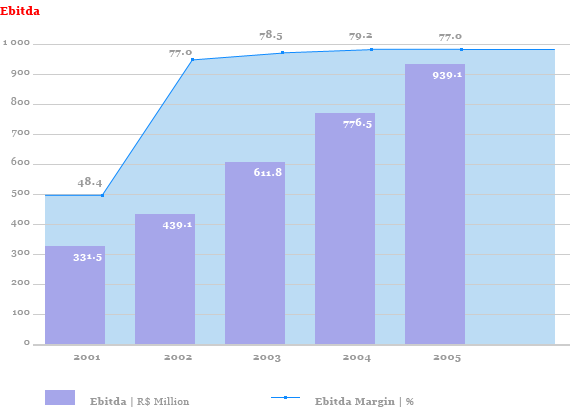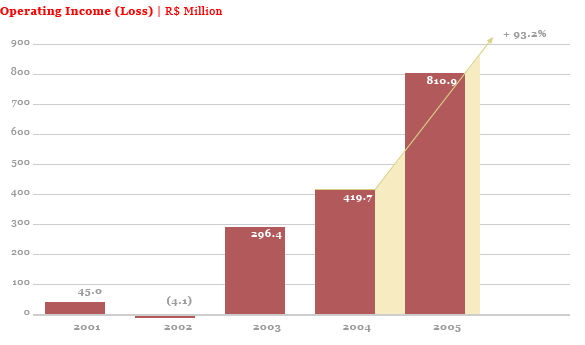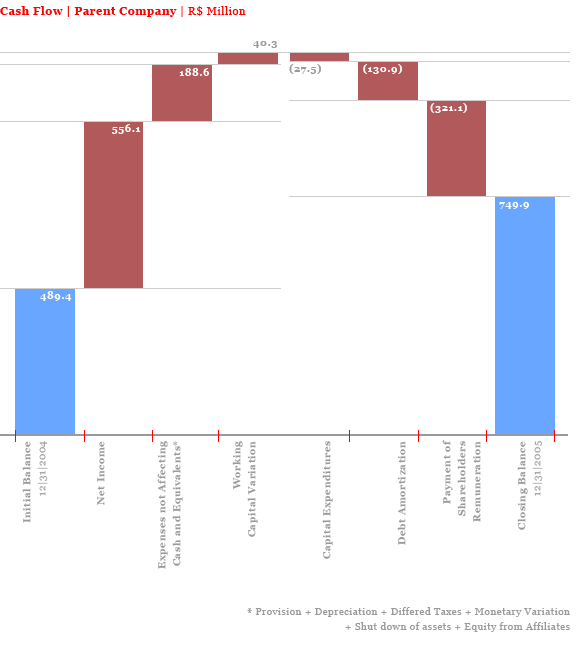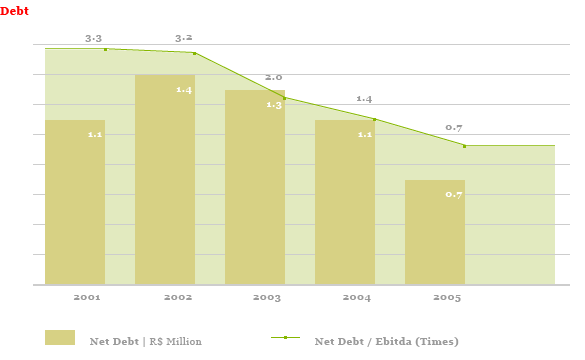|
 |
| Home Economic
and Financial Performance |
 |
| Revenues |
 |
AES Tietê posted
a record-breaking performance during 2005. With full operational stability
and all assured energy contracted, consolidated gross operating revenues
reached R$ 1.3 billion,
an amount that was 28.1% higher than in 2004.
Over 2005, the Bilateral Contract, with a
tariff higher than the Initial
Contracts, represented 74.5% of the sales volume and 81% of the
Company’s
gross revenues. Also contributing to the good performance during the
period were the
annual readjustments of the Initial and Bilateral energy
sales contracts, of 7.5% on an average;
the reversal of a provision
of R$ 43.7 million and the recognition of regulatory assets regarding
the Initial Contracts.
Net revenues totaled R$ 1.2 billion, surpassing the mark of R$ 1 billion
for the first time,
representing an increase of 24.4% over 2004. The
increase of PIS and Cofins tax rates, which took
effect on the dates
of the readjustment of the Initial and Bilateral Contracts during 2004,
raised the deductions on gross revenues from R$ 69.5 million in 2004
to R$ 124.9 million in 2005.
As a result of this change in tax rates,
the increase in net revenues over the year was lower
than the increase
in gross revenues. |
 |
 |
 |
| Operating Costs |
 |
Operating costs totaled
R$ 344.9 million in 2005, an increase of 28.8% compared to 2004.
The
main changes were the result of: |
 |
— Operating
Provisions:
totaling R$ 76.6 million in 2005, these provisions refer to the
registration
of possible losses of credits related to the Extraordinary Tariff
Reset (RTE),
investments with Banco Santos and the renegotiation
of an equipment supply contract.
— Financial Compensation for
the Use of Water Resourcess: with an increase of the
reference tariff rate by 19.2% and rise of 7.6% in the volume of power
generated,
this account rose R$ 10.0 million, or 28.2% compared to
2004.
— Personnel:
the rise in the number of employees and the increase mandated by a
collective bargaining agreement applied as of July 2005 led to R$ 5.0
million (19.1%)
higher payroll costs in 2005.
— Other Costs: partially compensating
for the increase of some items in the Company’s costs,
the ending
of the obligation to pay the Public Asset Use Fee made it possible
to reduce the
this account by R$ 15.9 million, or 46.2%. |
 |
 |
 |
| Ebitda |
 |
Operating cash flow
generation as measured by EBITDA (earnings before interest, taxes,
depreciation and amortization) totaled R$ 939.1 million in 2005, an
increase of 20.9%
compared to the previous year. The posting of higher
operating provisions permitted a
reduction of 2.2 percentage points
in the EBITDA margin, which reached 77.0%. |
 |
 |
 |
 |
 |
| Financial Performance |
 |
AES Tietê’s
net financial expenses in 2005 declined 78.1% over the previous fiscal
year,
totaling R$ 64.2 million. This performance was influenced both
by the reduction in
expenses as well as the increase in income.
Accrued financial expenses totaled R$ 166.3 million, which was the
equivalent to a 49.4%
reduction over 2004, mainly reflecting the decline
in monetary variation,
from R$ 170.8 million in 2004, to R$ 6.1 million
in 2005. The strong variation was a
consequence of the decline in the
IGP-M, the index that adjusts the Company’s main debt,
which
went from 12.4% in 2004 to 1.2% in 2005.
Simultaneously, financial income grew 189.9%, going from R$ 35.2 million
in 2004 to
R$ 102.0 million in 2005, due to the increase in investments
in securities linked to the
CDI (Interbank Deposit Certificate ) and
the high yield rates during 2005.
The balance of financial income also
included gains through monetary adjustment of the
RTE receivables,
in the amount of R$ 31.0 million. |
 |
 |
 |
| Net Income |
 |
Net earnings in 2005
totaled R$ 556.1 million, an increase of 90.7% compared to in the
R$
291.5 million reported the previous year. The net margin was 45.6%,
which represented an
increase of 15.9 percentage points over 2004. |
 |
| Cash Flow |
 |
AES Tietê’s
characteristic of strong cash generation led to a cash balance at the
end of 2005 of
R$ 794.5 million, which was 62.4% higher than the position
at December 31, 2004,
after the payment of all of the Company’s
obligations. The principal disbursements during the year
included payment
of R$ 321.1 million as compensation to shareholders and R$ 130.9 million
regarding debt amortization. |
 |
 |
 |
| Debt |
 |
By the end of the
year, the Company’s net debt totaled R$ 676.5 million, with
a reduction of
R$ 419.8 million compared to the position at December
31, 2004. This decline was the result of the
settlement of a debt
inherited from the Fundação Cesp (FunCesp II) at the
time of privatization and
greater volume of funds due to the strong
generation of cash and increase in the volume of
investments on the
financial market. The reduction of the debt and associated increase
in the
EBITDA in 2005 led to a strong decline in the Company’s
leveraging, represented by the
net debt/EBITDA ratio.
|
 |
 |
 |
AES Tietê carries
no bank financing on its books. Its major debt consists of a loan agreement
with Eletrobrás, a legacy from the privatization process maturing
in 2013 whose balance was
R$ 1.5 billion at the end of 2005. Interest
is 10% annually, with the principal amount
adjusted annually according
to the variation in the IGP-M.
The Company also maintains another obligation, also inherited from
privatization,
with the institutions that manages its benefits plan
(Fundação Cesp). The FunCesp III debt,
deriving from
the debt assumption for financing the actuarial deficit of the Settled
Proportional
Supplementary Benefit (BSPS), will mature in 2017. The
balance of this loan is adjusted
according to the actuarial cost variation
or the general price index (IGP-DI), whichever is the
higher, plus
annual interest of 6%. On December 31, 2005, the balance of this debt
totaled
R$ 17.2 million, of which 91.7% matures over the long-term. |
|



